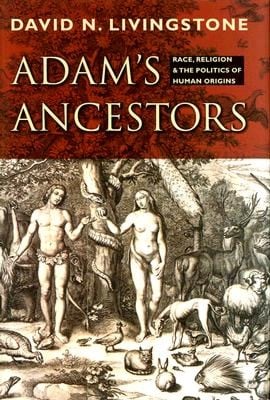
I am currently reading a book by David N. Livingstone, Adam’s Ancestors: Race, Religion, and the Politics of Human Origins. David Livingstone is Professor of Geography and Intellectual History at Queen’s University, Belfast and this book reflects both of his interests. It is a readable, but thorough and academic, book looking at the history of the idea of pre-adamic or non-adamic humans in western Christian thinking from the early church (Origen, Gregory of Nyssa, and Augustine) through the middle ages, the explorations of the fifteenth and sixteenth century, the debates on racial supremacy, and on to the present day. The book presents an interesting survey and puts many factors into perspective – it is well worth a few posts.
As we open the series I would like to consider a simple question: Why is the story of Adam and Eve – or even the entire primeval history in Genesis 1-11 a problem? There are several candidate reasons to consider:
(1) The recognition of inconsistencies in the Genesis account.
(2) The presence of records indication the existence of civilizations predating Adam (Egyptian, Chaldean, Mesopotamian, etc.)
(3) The increased exploration of the world and the discovery of humans in
the new world.
(4) The consideration of human language in connection with the Genesis
story.
(5) Darwin’s theory of evolution including common descent.
In your mind which factors contributed most significantly to the Challenge of
Adam in Christian thought?
The challenge of Adam arises from all of these factors, but Livingstone’s book points out that the intellectual issues really came to the fore with the discovery of human civilizations and evidence of ancient settlement spanning the globe. The accumulation of a variety of lines of evidence eventually led to crisis. Darwin was a late comer to the picture and evolution is a (relatively) minor contributor.
Inconsistencies in the Genesis record were recognized very early on – but pointed to an allegorical interpretation of the story while retaining Adam and Eve as unique persons.
Origen (ca.185-254) in On First Principles Book 4 as
translated from the Greek.
For who that has understanding will suppose that the first,
and second, and third day, and the evening and the morning, existed
without a sun, and moon, and stars? and that the first day was, as it
were, also without a sky? And who is so foolish as to suppose that God,
after the manner of a husbandman, planted a paradise in Eden, towards
the east, and placed in it a tree of life, visible and palpable, so that
one tasting of the fruit by the bodily teeth obtained life? and again,
that one was a partaker of good and evil by masticating what was taken
from the tree? And if God is said to walk in the paradise in the
evening, and Adam to hide himself under a tree, I do not suppose that
anyone
doubts that these things figuratively indicate certain mysteries, the
history having taken place in appearance, and not literally.
(Anti-Nicene Fathers Vol. 4, p. 365)
Peter Bouteneff in his book Beginnings:
Ancient Christian Readings of the Biblical Creation Narratives summarized Origen’s nuanced view as follows: “Yet the Holy
Spirit dictated not history but stories that contained complexities and
difficulties, with the intention of inviting readers into the deepest
and most serious engagement.” (p.118)
Gregory of Nyssa (ca. 335-394+) is another early thinker who struggled with these ideas, according to Livingstone he appears “to have thought that Adam’s physical body was derived from animal forebears.” (p. 6-7). Bouteneff considers Gregory’s view of humanity and of the nature of the “skin” of mortality – the animal body for humanity – and summarizes:
Gregory does not envision a historic pre-fallen immortal state, although he posits Adam as the beginning of human genealogy (as well as Christ’s), he alludes twice in the Catechetical Oration to the fact that Moses is speaking through a story, or an allegory. The implication of this is that God’s addition of mortality is a part of his creation of humanity from the beginning, in foreknowledge of the ongoing fall. (p. 164).
The records of civilization predating Adam were also noted, but routinely dismissed as fabulous, by the early church fathers. The recorded Egyptian dynasties extend back some thousand years or more before Noah, the flood, or the Tower of Babel. Roughly speaking the great pyramid at Giza was constructed ca. 2560 B.C.E. approximately the same time as the Genesis narrative places the flood, with continuous Egyptian civilization predating and postdating this time. Livingstone notes that Augustine (354-430) confronted these ideas:
Indeed, the continuing dispute over chronology was sufficiently strong that he devoted a whole chapter of The City of God to “the falseness of the history which allots many thousand years to the world’s past” and another chapter to the “mendacious vanity” and “empty presumption” of the Egyptians in claiming “an antiquity of a hundred thousand years ” for their accumulated wisdom. (p. 9)
While Augustine had no doubt that these reports were false, the seeds of inconsistency and discrepancy were present and were factors to be considered – if only to be refuted soundly.
The increased global exploration of the late fifteenth, sixteenth and seventeenth centuries – roughly Columbus onward – intensified the significance of the discrepancies in Genesis, the inconsistency of the world with the Genesis accounts of Adam, Noah, and Babel. Records from and encounters with the broad spread of humanity introduced a myriad of factors that could not easily be brushed away or ridiculed and decreed into submission. In this environment there was an explosion of thought centered on pre-adamic or non adamic men and a push toward a critical reading of the Biblical accounts.
This is enough for one post – what do you think? What factors contribute most significantly to the Challenge of Adam and the way we approach and read the primeval history of Genesis 1-11?
If you wish to contact me, you may do so at rjs4mail[at]att.net

